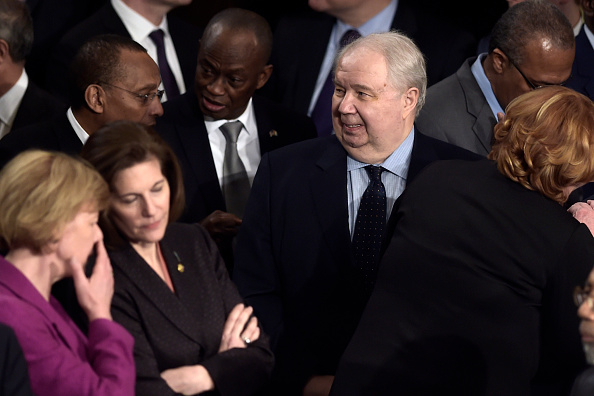Is Russian ambassador Sergey Kislyak a spy or a diplomat? Both, say Russia experts.


A free daily email with the biggest news stories of the day – and the best features from TheWeek.com
You are now subscribed
Your newsletter sign-up was successful
Russian ambassador Sergey Kislyak is, by all accounts, genial, fiercely protective of Russian policy and international prestige, an avid and successful social networker, and a diplomat who prefers private meetings and dinner parties to public events. He is also, to his and President Trump's discomfort, a central figure in Washington right now, due to his several meetings during the presidential campaign with several top Trump advisers, including Attorney General Jeff Sessions and former National Security Adviser Michael Flynn.
Kislyak is a veteran diplomat with a background in arms control, and he has been Russia's top diplomat in Washington since 2008. Given his new high profile and the mounting questions about Trump's connections to Russian officials — and the Trump team's evasiveness on the subject — there's a new question: Is Kislyak a spy? NBC's Katy Tur asked that question to Peter Baker, New York Times chief White House correspondent and a former Moscow bureau chief for The Washington Post, on Thursday. "Well, look, in the Russian system it's a distinction without a difference," he said.
Some other Russia experts and analysts agree. Spy or diplomat? "For them it's much grayer," Steven Hall, former head of Russia operations at the CIA, tells The Washington Post. "I would say [Kislyak] is most definitely both. In the Russian system, it's simply assumed that they're all collecting and doing whatever they can either covertly or overtly." That's not a view everyone shares. The idea that Russia's ambassador is a top recruiter for its SVR foreign intelligence agency "strikes me as pretty odd," Steven Pifer, a former State Department official, tells The Guardian. "Everything I've seen, he's been a Russian diplomat." Russia, unsurprisingly, is pushing back against the idea.
The Week
Escape your echo chamber. Get the facts behind the news, plus analysis from multiple perspectives.

Sign up for The Week's Free Newsletters
From our morning news briefing to a weekly Good News Newsletter, get the best of The Week delivered directly to your inbox.
From our morning news briefing to a weekly Good News Newsletter, get the best of The Week delivered directly to your inbox.
Either way, Kislyak has said he will leave Washington soon, likely replaced by a hard-line Russian general, though his replacement has not been announced. Moving on is probably all right for Kislyak, because Russia is so toxic now in Washington, The New York Times reports: "It has become lonely, and he has told associates that he is surprised how people who once sought his company were now trying to stay away."
A free daily email with the biggest news stories of the day – and the best features from TheWeek.com
Peter has worked as a news and culture writer and editor at The Week since the site's launch in 2008. He covers politics, world affairs, religion and cultural currents. His journalism career began as a copy editor at a financial newswire and has included editorial positions at The New York Times Magazine, Facts on File, and Oregon State University.
-
 The Week Unwrapped: Have televised confessions quelled protests in Iran?
The Week Unwrapped: Have televised confessions quelled protests in Iran?Podcast Plus, why has Elon Musk turned from Mars to the Moon? And will the BBC prove to be a puzzles champ?
-
 The week’s best photos
The week’s best photosIn Pictures An Andean god, a rogue squirrel, and more
-
 9 products to jazz up your letters and cards
9 products to jazz up your letters and cardsThe Week Recommends Get the write stuff
-
 Nobody seems surprised Wagner's Prigozhin died under suspicious circumstances
Nobody seems surprised Wagner's Prigozhin died under suspicious circumstancesSpeed Read
-
 Western mountain climbers allegedly left Pakistani porter to die on K2
Western mountain climbers allegedly left Pakistani porter to die on K2Speed Read
-
 'Circular saw blades' divide controversial Rio Grande buoys installed by Texas governor
'Circular saw blades' divide controversial Rio Grande buoys installed by Texas governorSpeed Read
-
 Los Angeles city workers stage 1-day walkout over labor conditions
Los Angeles city workers stage 1-day walkout over labor conditionsSpeed Read
-
 Mega Millions jackpot climbs to an estimated $1.55 billion
Mega Millions jackpot climbs to an estimated $1.55 billionSpeed Read
-
 Bangladesh dealing with worst dengue fever outbreak on record
Bangladesh dealing with worst dengue fever outbreak on recordSpeed Read
-
 Glacial outburst flooding in Juneau destroys homes
Glacial outburst flooding in Juneau destroys homesSpeed Read
-
 Scotland seeking 'monster hunters' to search for fabled Loch Ness creature
Scotland seeking 'monster hunters' to search for fabled Loch Ness creatureSpeed Read
